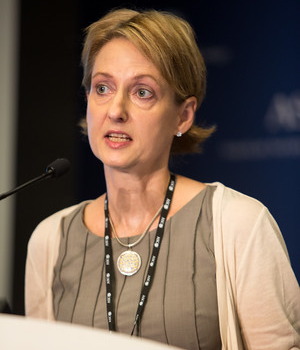Adding Obinutuzumab Improves PFS in Refractory NHL
Obinutuzumab in combination with bendamustine followed by obinutuzumab maintenance improved PFS over bendamustine monotherapy in patients with refractory non-Hodgkin lymphoma.
Laurie Helen Sehn, MDCM, MPH, presenting the trial data. Photo © ASCO/Scott Morgan 2015.

Obinutuzumab in combination with bendamustine followed by obinutuzumab maintenance therapy offered improved progression-free survival (PFS) over bendamustine monotherapy in patients with non-Hodgkin lymphoma, according to a randomized phase III trial (abstract 8502) presented at the 2015 American Society of Clinical Oncology (ASCO) Annual Meeting, held May 29 to June 2, in Chicago.
“Despite an increase in the number of chemotherapeutic options, advanced stage indolent non-Hodgkin lymphoma remains incurable,” said Laurie Helen Sehn, MDCM, MPH, of British Columbia Cancer Agency in Vancouver. She presented results of the GADOLIN trial, which tested the efficacy of obinutuzumab, a novel type 2 anti-CD20 monoclonal antibody, in patients with disease refractory to rituximab.
The study included 194 in the combination arm, and 202 on the bendamustine monotherapy arm. At the time of a planned interim analysis, 6 combination patients and 13 monotherapy patients remained on induction therapy; 16.5% of patients withdrew from the combination arm, compared with 27.7% on bendamustine alone. A total of 143 patients went on to receive obinutuzumab maintenance, and 46 were still on the drug at the time of analysis.
At baseline, there were no significant differences between the groups; the average age in the study was 63 years. Most patients (92% and 93% in the two arms) were refractory to their last therapy, and 76% and 81% were double refractory to rituximab and alkylators.
The study met its primary endpoint regarding PFS. After a follow-up of 23 months, the median PFS in the combination group was not reached, compared with 14.9 months in the monotherapy group. This yielded a hazard ratio for progression of 0.55 (95% CI, 0.40-0.74; P = .0001). There were 71 progression events (37%) with the combination compared with 104 events (51%) with bendamustine monotherapy.
Sehn said the overall survival data remains immature, but as yet there is no difference. Response rates were not significantly different between the groups.
There were similar rates of adverse events between the groups, with 67% of combination patients and 62.1% of monotherapy patients experiencing at least one grade 3/4 adverse event. There was slightly more grade 3/4 neutropenia with obinutuzumab (33% vs 26.3%), and slightly more thrombocytopenia with bendamustine monotherapy (10.8% vs 16.2%).
The discussant for the session, Grzegorz S. Nowakowski, MD, of the Mayo Clinic in Rochester, Minnesota, noted that a cost analysis shows the bendamustine regimen in this study would cost almost $100,000 less than the combination regimen. However, if relapse happens earlier, then costs of subsequent therapies may flip that equation.
“In my opinion,” he concluded, “this is a practice-changing study. It does provide significant PFS benefit, and it doesn’t do it at the cost of increased toxicity.”